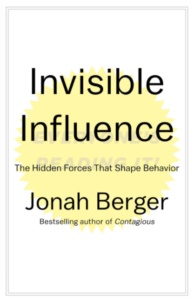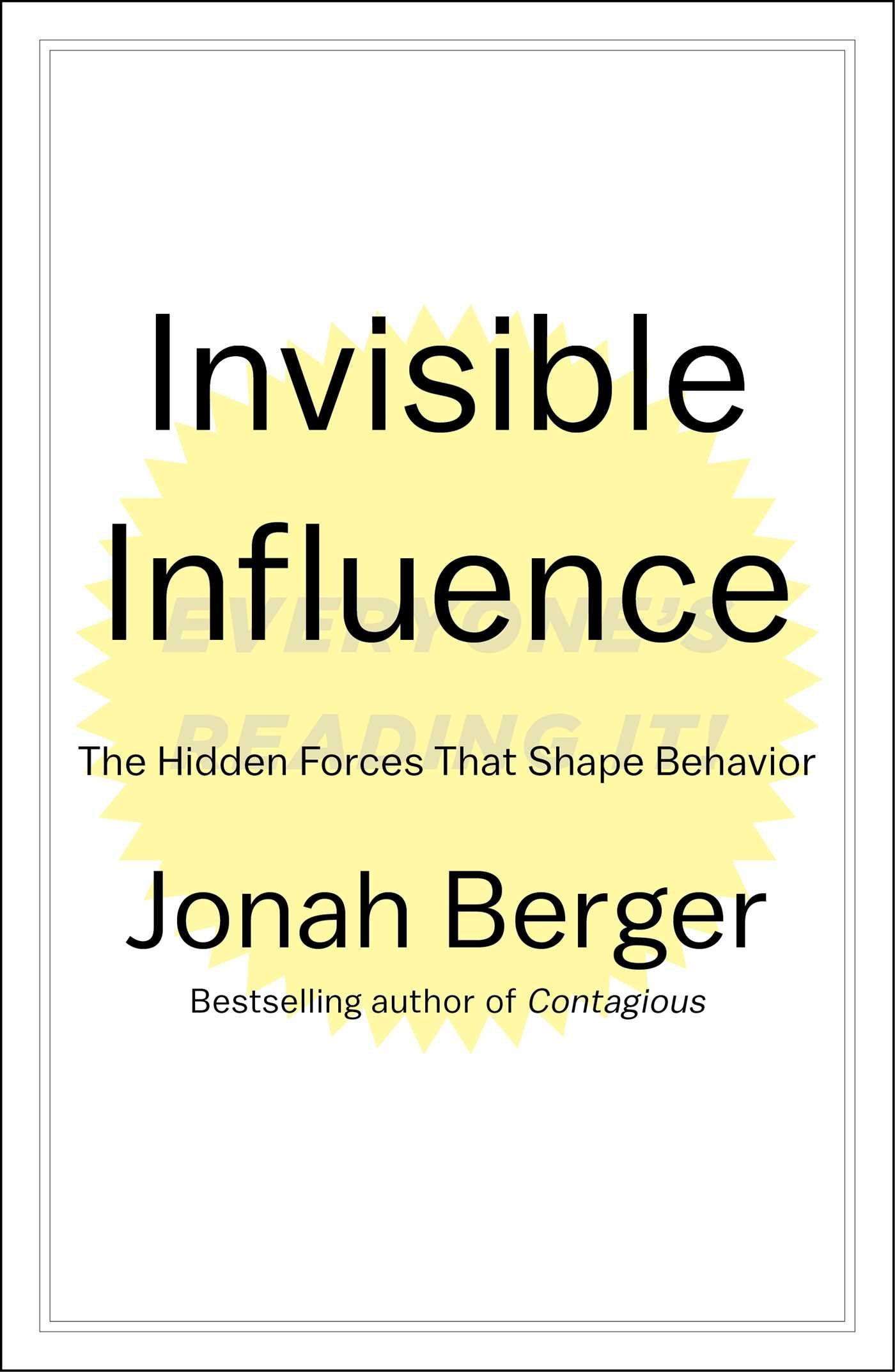I really enjoyed this book, and Jonah Berger’s other book, Contagious. I was initially afraid that this book would just be a copy of Robert Cialdini’s book Influence, but I was pleasantly surprised! While there is some overlap, I think that you’ll gain some new insights from Invisible Influence, particularly if you’re in the marketing field.
 Most of the negative reviews of the book that I’ve come across through Amazon point to the fact that the book “could have been a magazine article” and that the book didn’t leave as big of an impression as Jonah’s last book.
Most of the negative reviews of the book that I’ve come across through Amazon point to the fact that the book “could have been a magazine article” and that the book didn’t leave as big of an impression as Jonah’s last book.
I think it really depends on how much you already know about the topic of influence. Overall, I’m glad I read the book and I’ll be including some of my notes below. I do think that if you’re pretty familiar with influence-based marketing, this book might be a tad too simple for you.
In this book, Berger explores some of the forces that influence our purchasing decisions and general behavior in society. Many of the ideas that we have or choices we make are actually a direct result of the impact that other people have had on us. Sometimes, we’ll conform. Other times, we’ll try to stand out.
If you want to learn more, go and pick up a copy of Invisible Influence by Jonah Berger. You can check out my notes below to gives you an idea of what the book is about.
My Notes and Thoughts
“The idea that mere exposure increases liking may seem stranger at first. Familiarity leads to liking.”
This is very true, both in terms of sales, dating, and your friend group!
“Even when the answer is clear, people still imitate others.” “When we’re not sure about the right thing to do, we look to others to help us figure it out.”
In this quote, Berger is referencing how when presented with the decisions that other people have made about a particular choice, we’ll often times go along, even if we know that choice is incorrect. This is especially true when w’ere not as sure about the correct answer or what to do in a given situation.
Most people “just want to be a part of the group.” There is a strong desire to be a part of a community or group. I think this is one of the reasons that religion is so popular.
“Turns out that the same cells that fired when the monkey took an action were also firing when the monkey observed someone else take that action… watching someone else engage in an action activates the same cortical region as engaging in that action.”
This is one of the reasons that we will experience an emotional response when we watch movies! It’s the most basic form of empathy.
“If someone acts like us, or behaves similarly, we may infer we have things in common or are part of the same tribe. Part of this may be driven by the association between similarity and kinship. Because we tend to imitate those around us, seeing someone doing the same thing we’re doing may serve as a non-conscious signal that we are connective in some way. If someone has the same accent or loves the same brand we feel an affinity or bond. These connections, in turn, lead to greater liking, and smoother interactions.”
I can’t underscore how powerful this topic is. It’s why actors that are similar to the viewer tend to make those viewers more interested in a product. It’s also why we choose to be friends with the people that we are friends with. We assume similarity in other areas because we connect on one thing.
“Providing information about other people’s choices has a big impact.” “If that many people bought it, it must be good.” “Following others saves us time and effort and hopefully leads us to something we’re more likely to enjoy.” “Social influence only works when other people’s opinions or behaviors are observable.” “Nothing draws a crowd like a crowd.”
I lumped these quotes together because they all get to the heart of how others influence us in our own daily decisions. Quite frankly, most people are too busy, tired, and overwhelmed to analyze every single decision in their life. That’s why they rely on the collective group knowledge to help them make decisions. While this strategy will work most of the time, it doesn’t work all of the time.
“You’re unhappy when someone makes you less distinct with their choice (in small ways).” “The more something matters to us, the more distinctive we assume it is.”
We all like to feel unique and special. When we feel like we are a cookie-cutter creation or that we have very cliche tastes, it hurts that view of ourselves, and damages our sense of identity. I really hate feeling like I’m ordinary.
“For many working class people, their occupation is a means to an end rather than a signal of identity.”
I’ve witnessed this with some friends, and to be honest, it surprised me. I associated my identity quite strongly with what I do for a living (as do most men in my opinion).
“You’re not purchasing a product, you’re buying a ticket to a certain lifestyle and everything that comes with it.” “Wealth is often private. No one but you and your spouse knows how much money you have in your bank account. Status, however, is social. It is attained in the eyes of others. The respect of one’s peers.”
I completely agree with the above quote, and one of the reasons that I discovered the whole “lifestyle business” sector. It also never did make sense to me why people shun talking about money but love to talk about things they’ve bought with money. I guess that’s just how human nature and society works.
“The more you see something, the more you like similar things as well.”
Humans crave a feeling of familiarity. I think that’s also one of the reasons that we tend to date the certain kinds of people, unless we specifically realize that type is bad for us and we put effort into changing our choices.
“Humans strive for validation. We want to be part of something. Being similar to, or doing the same thing as, others gives us confidence that we are doing something right.”
This is a very hard emotional craving to combat, especially when you’re starting a new business. It’s very weird to feel like you’re doing something that not many other people are. It feels wrong, or like you’re making the incorrect choice in life.
“Brand is an identity-relevant attribute. It communicates information about the social identity and preferences of the person wearing the brand.”
- Spectators increase performance when the task is not complex or you’ve done it before. They inhibit it when the task is difficult or you’re learning something new.
- When you’re informed that X percent of your neighbors use this or do this, it will cause you to alter your behavior to be in-line with those individuals. In terms of saving energy, it could make you turn off your air conditioning more.
- “Emphasizing that the candidate was behind raised 60 percent more money.”
